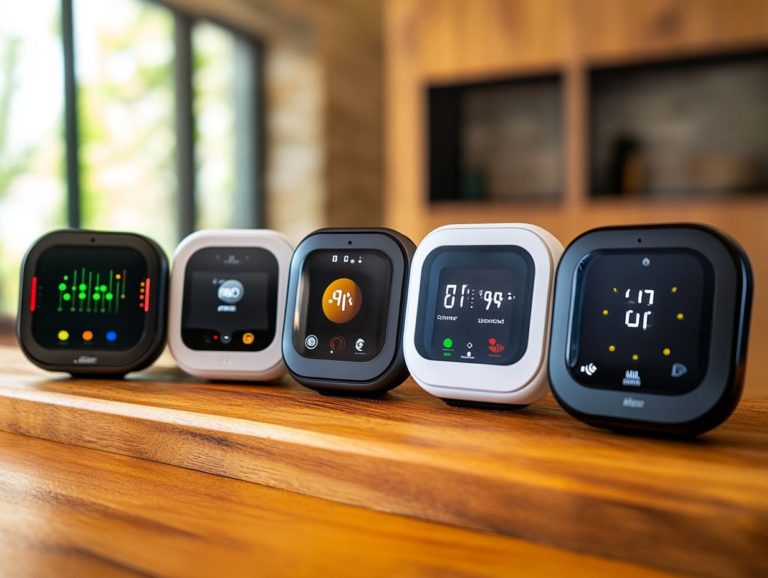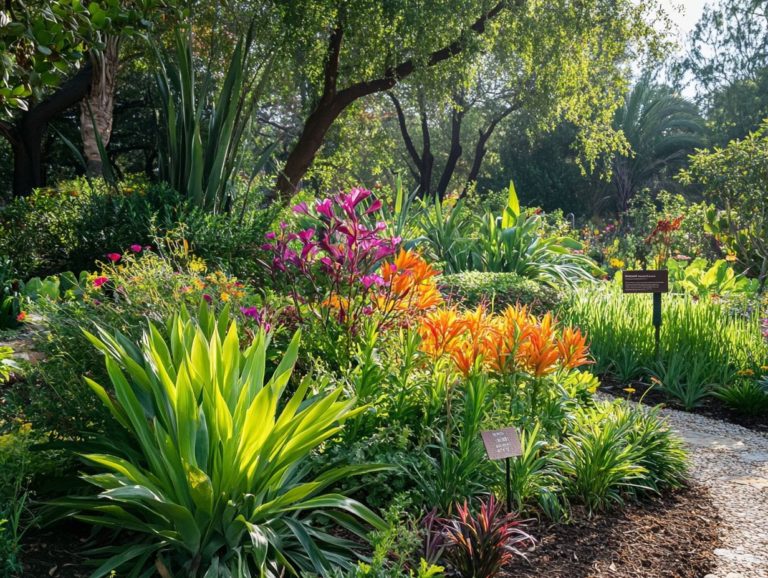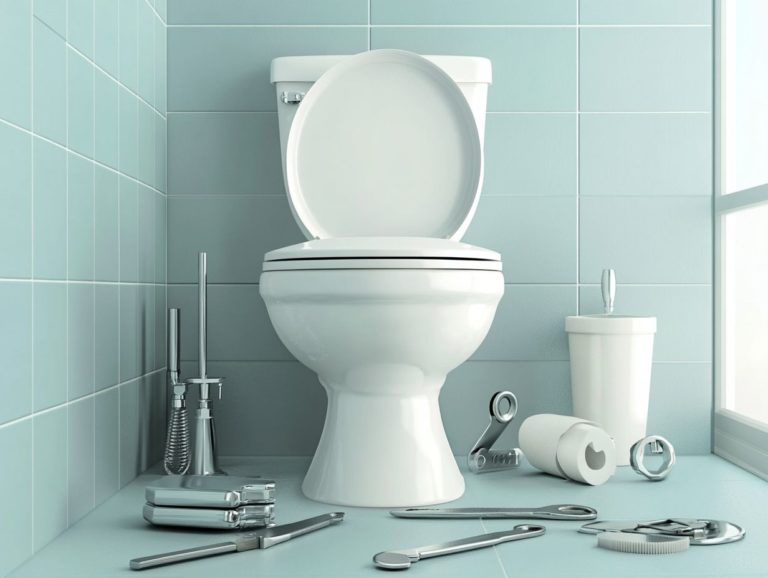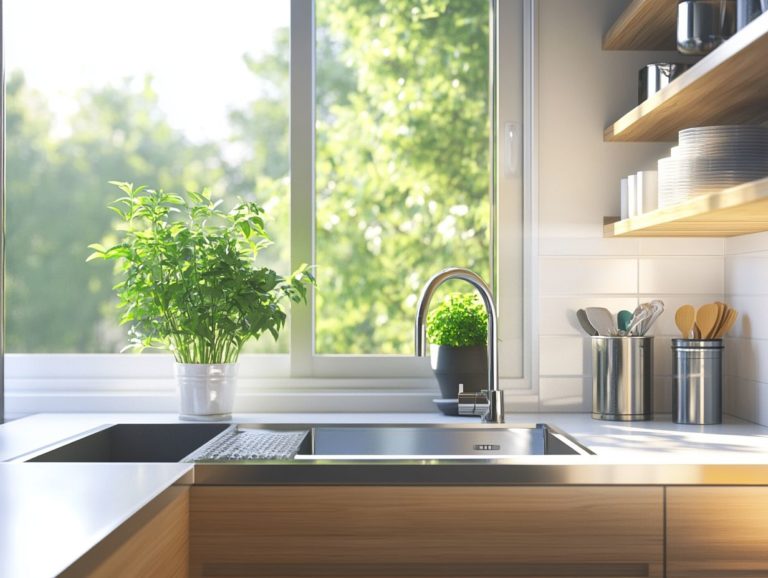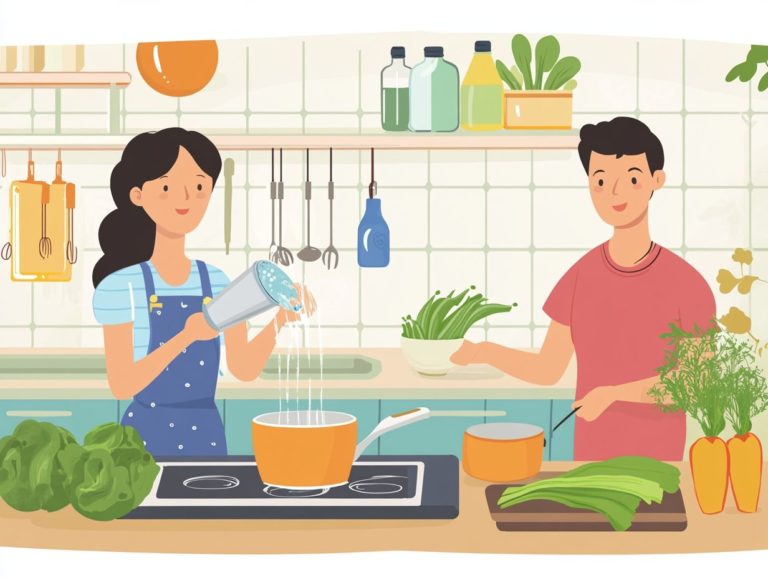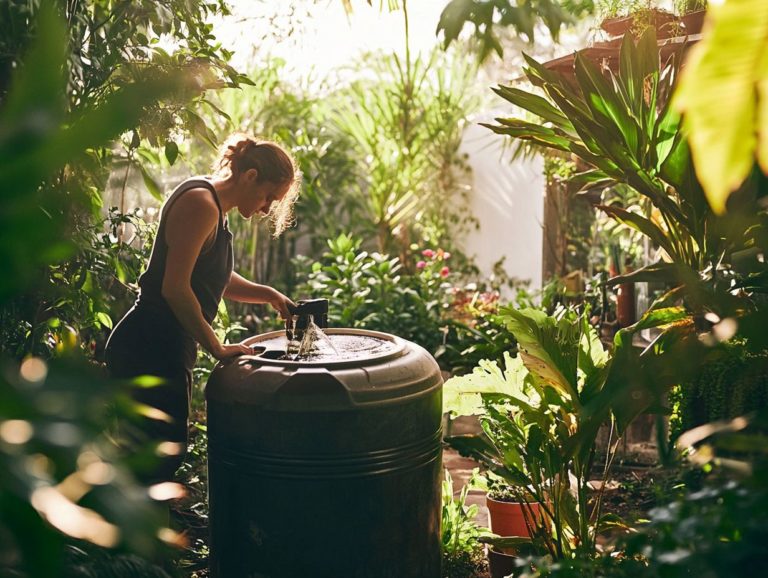5 Essential Water Conservation Resources for Homeowners
Water conservation is vital for sustainable living and protecting our planet’s most important resource.
In this article, you ll uncover five essential tools and strategies to reduce your water usage. From innovative appliances to smart landscaping techniques, conserving water can enhance your home and save you money.
You’ll debunk myths, learn to monitor your usage effectively, and find inspiration to lead in your community s water conservation efforts.
Contents
- Key Takeaways:
- 1. Water-Saving Appliances
- 2. Low-Flow Fixtures
- 3. Rainwater Harvesting Systems
- 4. Drought-Tolerant Landscaping
- 5. Greywater Systems
- What Is Water Conservation and Why Is It Important?
- How Can Water Conservation Benefit Homeowners?
- What Are the Most Effective Ways to Conserve Water at Home?
- How Can Homeowners Monitor Their Water Usage?
- What Are Some Common Myths About Water Conservation?
- How Can Homeowners Encourage Others to Conserve Water?
- Frequently Asked Questions
- What are the 5 essential water conservation resources for homeowners?
- How can low-flow fixtures help with water conservation at home?
- What is the purpose of rain barrels for water conservation?
- How do drought-resistant plants contribute to water conservation?
- What is a leak detection kit and how can it help with water conservation?
- What are greywater systems and how do they promote water conservation?
Key Takeaways:
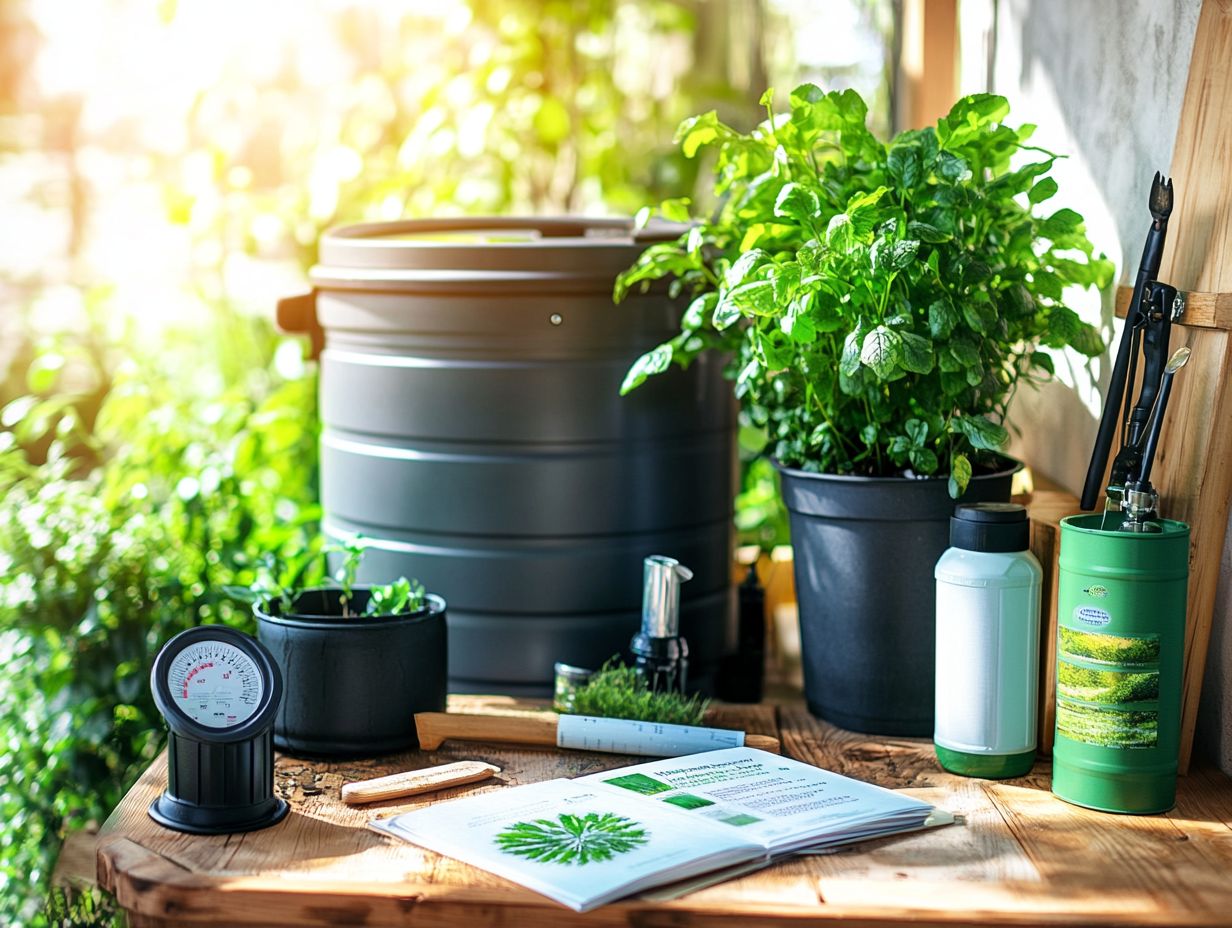
1. Water-Saving Appliances
Water-saving appliances help you use less water and save money on bills. ENERGY STAR and WaterSense labeled products are great choices.
These appliances reduce your water use and environmental impact. High-efficiency toilets use advanced technology to save water with every flush.
Water-efficient washing machines adjust water levels based on load size, maximizing every drop. Modern dishwashers also consume less water while cleaning your dishes perfectly.
2. Low-Flow Fixtures
Low-flow fixtures, like efficient toilets and showerheads, are key for water conservation. They cut down on water use without sacrificing performance.
Installing these fixtures can prevent waste and lower your bills. Consider faucets with low-flow aerators for extra savings.
Professional guidance is crucial for installing these fixtures correctly. Embracing low-flow options supports larger environmental efforts to conserve water.
3. Rainwater Harvesting Systems
Rainwater harvesting systems collect and store rainwater for various uses. They significantly improve water management and help during droughts.
These systems supplement your outdoor watering needs and can reduce your water bills. Captured rainwater nourishes gardens, especially in dry areas.
To set up a rainwater harvesting system, follow these steps:
- Install a properly sized storage tank.
- Maintain gutters and downspouts for maximum collection.
Regularly check for debris in the tank to keep water pure. Use a first-flush diverter to minimize contamination.
4. Drought-Tolerant Landscaping
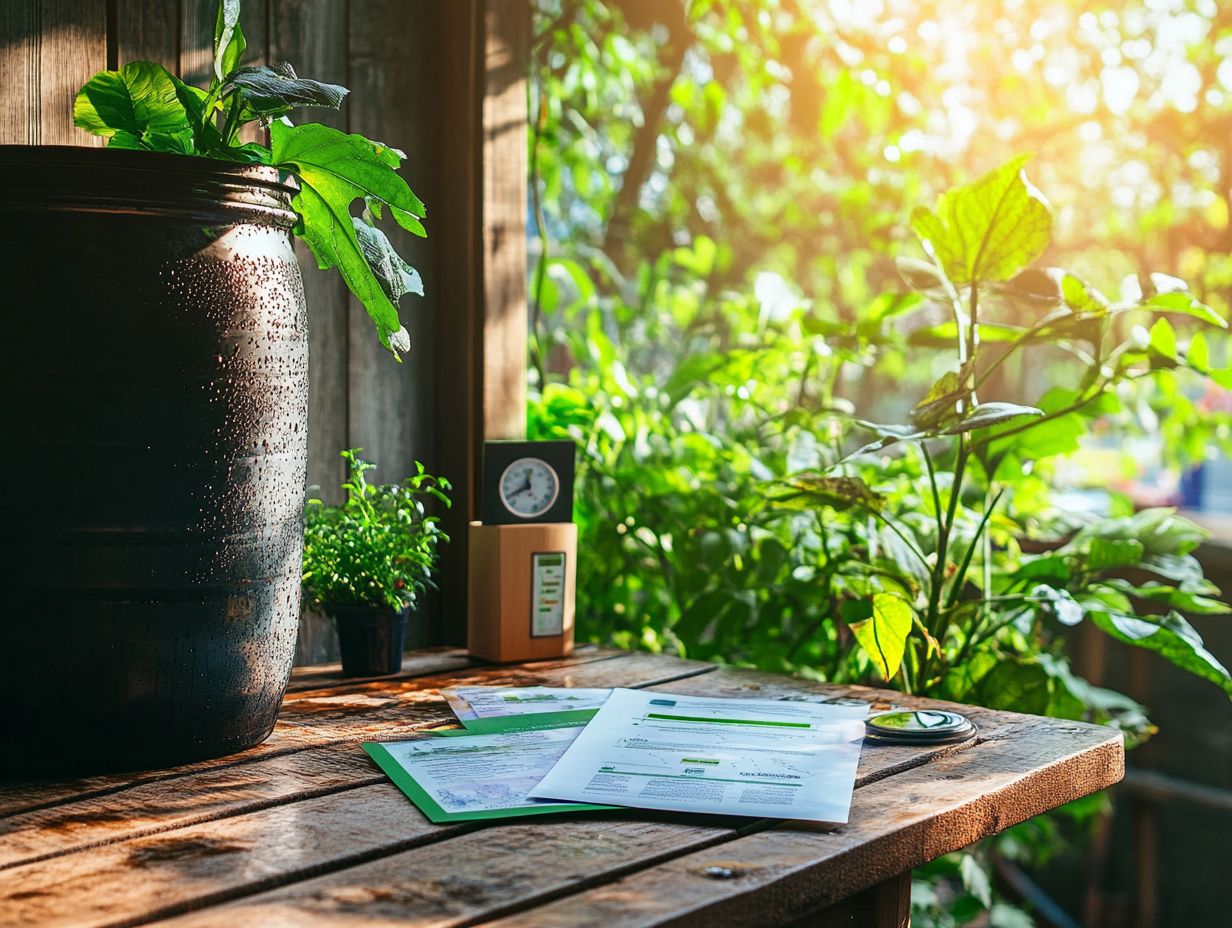
Drought-tolerant landscaping conserves water and enhances soil health. It uses native plants and efficient designs.
This sustainable practice reduces outdoor watering needs and promotes biodiversity.
Select plant varieties that thrive in your local climate. This choice will cut maintenance efforts and encourage local wildlife.
Incorporating mulch retains soil moisture and suppresses weeds. A tailored watering schedule boosts efficiency.
Watering in the early morning or late evening limits evaporation. This way, you maximize every drop.
Embrace these strategies to create a vibrant, eco-friendly garden that thrives with minimal water.
5. Greywater Systems
Greywater systems allow you to reuse wastewater from sinks and showers. This practice significantly cuts down your water consumption.
By adopting these systems, you can improve the efficiency of your plumbing fixtures. This promotes sustainable living.
These systems conserve precious freshwater and help lower your household water bills. With proper installation, they comply with local regulations.
Understanding components like filtration and distribution will help maintain efficiency. This ensures longevity in your greywater systems.
Investing in greywater systems is a vital step toward a more eco-friendly lifestyle.
What Is Water Conservation and Why Is It Important?
Water conservation helps you use water efficiently. It reduces unnecessary usage and aids sustainable living.
As global water resources face pressure, conserving water is essential. It safeguards ecosystems and ensures access to clean water.
Effective strategies lead to savings on water bills and promote responsible consumption.
Simple measures like fixing leaks and using water-efficient appliances make a big difference. For example, Cape Town reduced daily water consumption by 60% through stringent practices.
Research shows water-saving techniques lessen competition for resources. This protects aquatic ecosystems dependent on stable water levels.
Your efforts in water conservation, such as following water-saving tips for apartment dwellers, ease the strain on local supplies and create a sustainable environment for future generations.
Start your water conservation journey today; small steps can lead to big changes!
How Can Water Conservation Benefit Homeowners?
Water conservation offers big savings for homeowners. You can lower your water bills and reduce utility costs while enhancing plumbing maintenance by using top water-saving appliances for your home.
By adopting water-saving habits and technologies, you can dramatically decrease your overall water usage. This paves the way for a more sustainable lifestyle and improved household efficiency.
For example, many households could save 20-30% on their water bills simply by using straightforward conservation practices. Installing devices that use less water, like low-flow showerheads and dual-flush toilets, is a great start!
These efforts also lower plumbing maintenance costs. Reduced water usage lessens the strain on pipes and fittings, which often lead to expensive repairs.
Act now by checking for leaks regularly and addressing them promptly to avoid unnecessary expenses.
Simple strategies, like setting a timer while showering or running the dishwasher only when it’s full, can significantly impact your water savings. These small changes accumulate over time, leading to substantial financial benefits for your household.
What Are the Most Effective Ways to Conserve Water at Home?
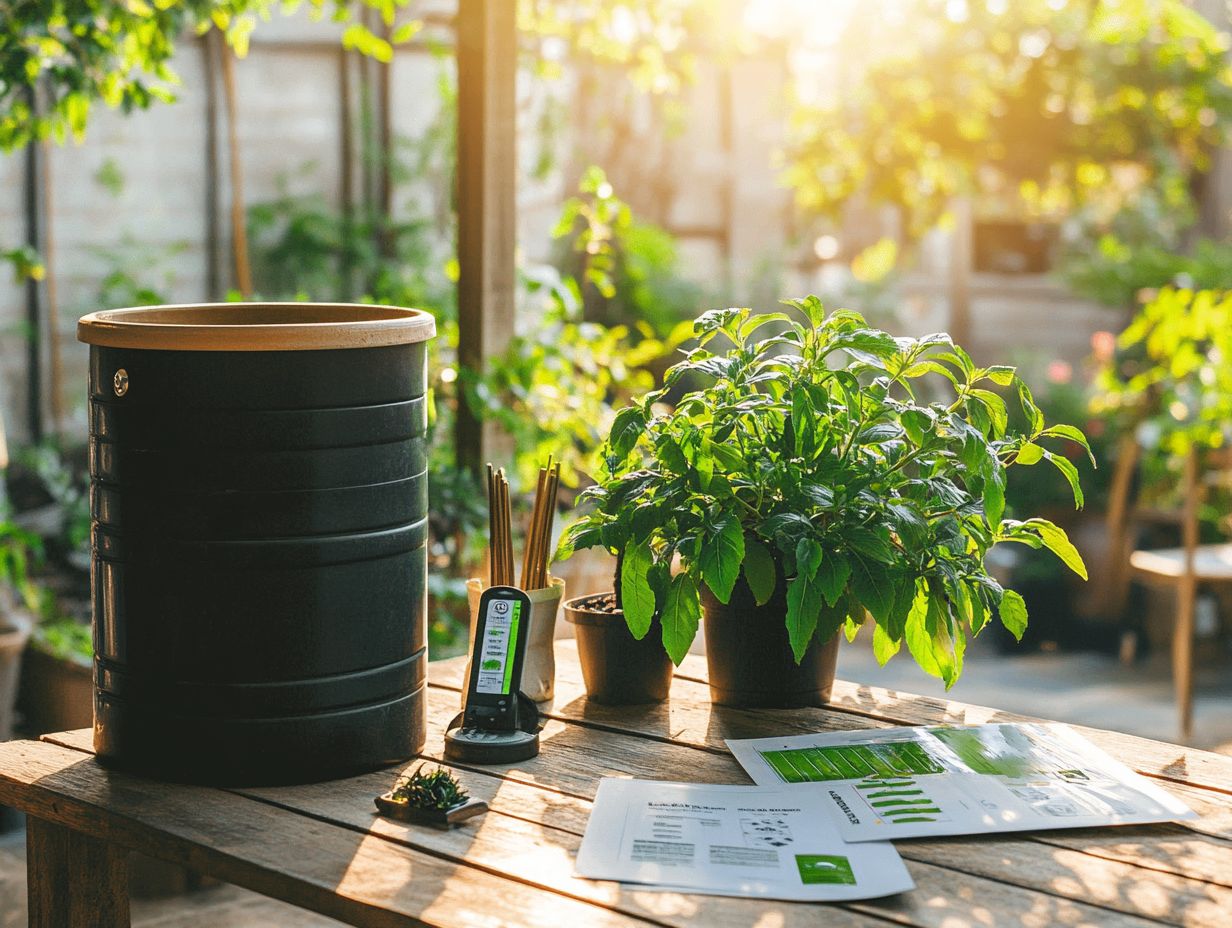
Implementing effective strategies to conserve water at home is essential for sustainable living. You can achieve this through 5 ways to make your home more water-efficient, incorporating simple yet impactful water-saving habits and eco-friendly products.
Start using these simple tips today! You can adopt conservation strategies such as utilizing smart irrigation systems, installing water-efficient appliances, and practicing mindful water use. Additionally, consider exploring DIY projects for water conservation at home. These measures can significantly cut down your water consumption.
In the bathroom, consider:
- Installing low-flow showerheads and faucets
- Regularly checking for leaks
Each small adjustment leads to noticeable differences. In the kitchen, boost efficiency by:
- Fully loading the dishwasher instead of washing dishes by hand
- Using a bowl to rinse vegetables rather than letting the tap run
For laundry, choose a high-efficiency washer and run loads only when it s full to streamline your water usage.
By weaving these practical strategies into your daily routine, you not only save money but also embrace broader environmental stewardship. This ultimately fosters a culture of sustainability that benefits everyone.
How Can Homeowners Monitor Their Water Usage?
Monitoring water usage is crucial for homeowners looking to reduce consumption and prevent waste. One effective approach is to explore 5 ways to recycle water at home, in addition to utilizing a water meter and scheduling regular plumbing maintenance checks.
By tracking your water consumption, you identify patterns, detect leaks early, and make informed decisions about usage. Learning to read a water meter provides valuable insights into your daily consumption, helping you spot irregularities.
This practice cultivates a responsible approach to water use and offers significant financial benefits, potentially leading to noticeable reductions in your monthly utility bills.
Being mindful of your consumption enables you to take proactive steps to address leaks or plumbing issues before they escalate into costly repairs. Regularly inspecting your plumbing system for signs of leaks like water stains or dampness can save you headaches down the line.
If you notice persistent problems, seeking professional help is a wise move to ensure efficient and sustainable water use.
Start conserving water today to enjoy these immediate benefits!
What Are Some Common Myths About Water Conservation?
Debunking common myths about water conservation is essential for fostering effective practices and promoting the adoption of water-saving technologies. These measures can help prevent waste and lower your energy bills.
By addressing misconceptions, you can make informed choices that enhance your water conservation efforts. For example, many people think that showering uses more water than bathing. However, research shows that a quick shower usually consumes less water than filling up a bathtub.
Another misconception is that water conservation is only about cutting back on usage. In reality, it also includes collecting rainwater and employing efficient irrigation systems.
You may think that low-flow fixtures compromise performance, yet modern designs are engineered to deliver high efficiency without sacrificing functionality.
By debunking these myths, you ll understand the real facts about water conservation. This understanding is crucial for effectively implementing sustainable practices and technologies.
Education plays an important role here, enabling you to adopt measures that help save water and energy. Ultimately, this fosters a community commitment to environmental stewardship.
How Can Homeowners Encourage Others to Conserve Water?
Homeowners have a unique opportunity to influence their community to conserve water by sharing valuable insights on water-saving habits. Utilizing resources like the top 7 water conservation apps for homeowners can showcase the positive impact conservation can have on both the community and the environment.
By fostering education and raising awareness, you can inspire friends and neighbors to adopt similar practices that help save water.
To amplify your efforts, consider organizing community workshops. Join us and be a part of the change! This can serve as a fantastic platform for individuals to exchange best practices and learn new techniques together.
Use social media to spread your message. Engaging content that highlights everyday water-saving tips and success stories from local initiatives can resonate with a broader audience.
Think about forming neighborhood collectives to launch challenges or events centered around reducing water waste. These collaborative efforts not only cultivate a sense of unity but also showcase the tangible benefits of collective action, such as lower utility bills and the preservation of local waterways for future generations.
Frequently Asked Questions
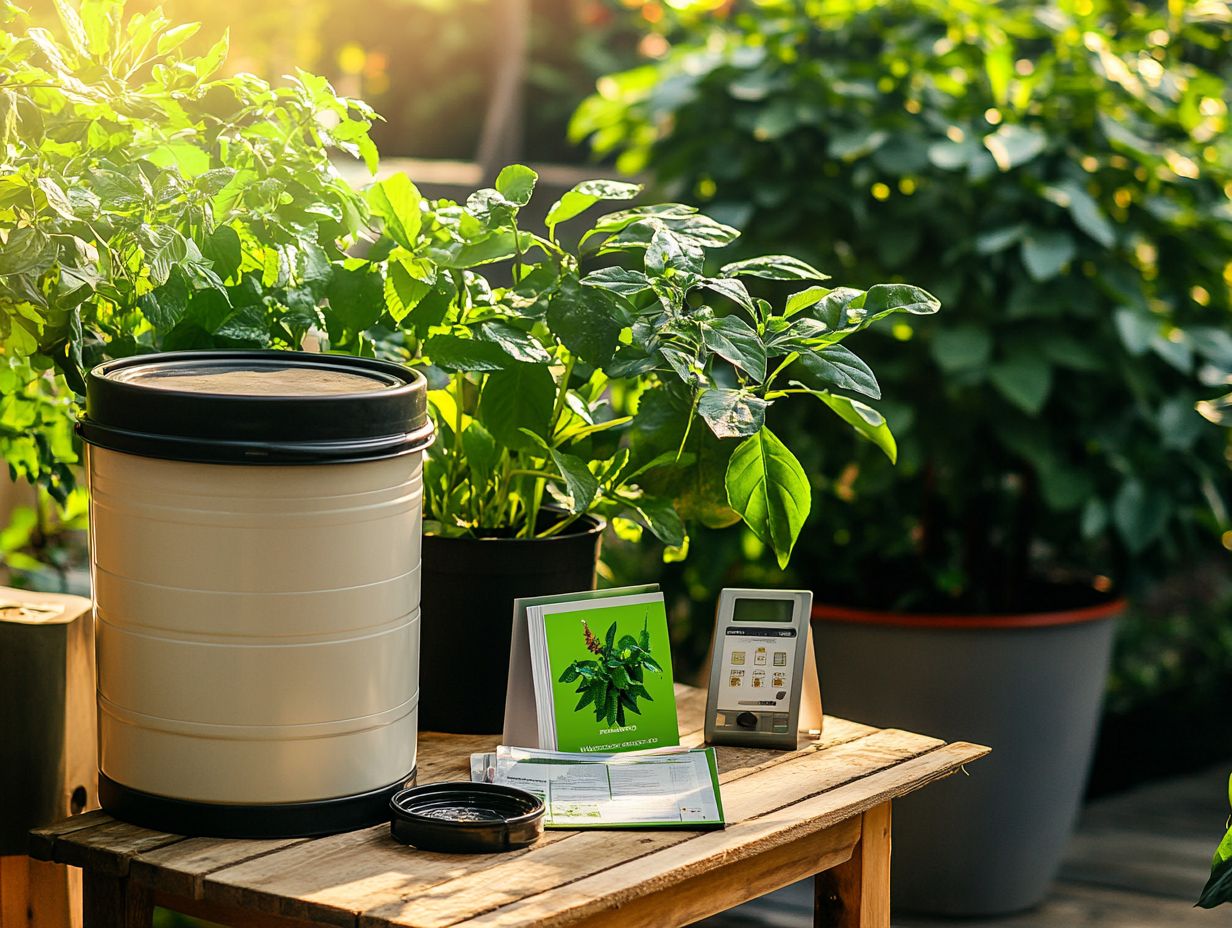
What are the 5 essential water conservation resources for homeowners?
The 5 essential water conservation resources for homeowners are:
- Low-flow fixtures
- Rain barrels
- Drought-resistant plants
- Leak detection kits
- Greywater systems
How can low-flow fixtures help with water conservation at home?
Low-flow fixtures, such as showerheads and faucets, limit the amount of water used without sacrificing water pressure. This can save gallons of water per day and reduce water bills.
What is the purpose of rain barrels for water conservation?
Rain barrels collect and store rainwater that can be used for watering plants and outdoor cleaning tasks. This reduces the need for using tap water and can save hundreds of gallons of water each year.
How do drought-resistant plants contribute to water conservation?
Drought-resistant plants are designed to survive with minimal water, making them a great choice for landscaping in dry climates. They require less watering and can help conserve water resources.
What is a leak detection kit and how can it help with water conservation?
A leak detection kit helps homeowners identify and fix leaks in their plumbing system. By fixing leaks, homeowners can save thousands of gallons of water each year and reduce their water bills.
What are greywater systems and how do they promote water conservation?
Greywater systems collect and filter water from sinks, showers, and washing machines for reuse in irrigation. This reduces the need for using fresh water for watering plants and can save a significant amount of water.

